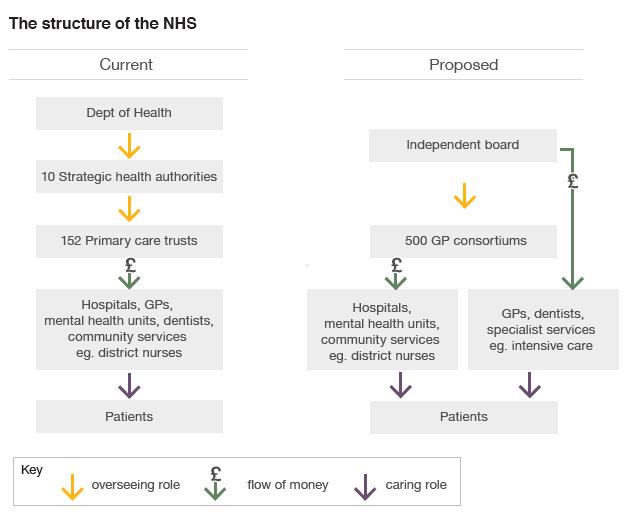NHS sets £1.7bn aside for reform
- Published

An overhaul of the NHS was announced on Monday
The NHS in England has set aside nearly £1.7bn this year for reorganisation - more than seven times what it aims to save on management, the BBC has learnt.
The fund - held back from the front line - will help pave the way for GPs to take over budgets from managers.
NHS boss Sir David Nicholson said it was there to kick-start the process.
The government said significant savings would be made in the long term, but unions voiced concerns about the spending spiralling out of control.
Under the plans, all 10 strategic health authorities and 152 local management bodies known as primary care trusts are to be abolished, affecting more than 60,000 managers.
In their place, hundreds of GP consortiums will be created and given the responsibility for much of the £105bn health budget.
In a letter to NHS trusts this week, Sir David said he wanted to see the first consortiums set up this year to start piloting the new system, before full roll out is completed by April 2013.
More funding is expected to be set aside in future years to support the changes, but the amount of money available for the first phase has led to questions being asked about the scale of the changes.
One expert writing in the British Medical Journal estimated that the total cost of the reorganisation could be between £2bn and £3bn.
Professor Kieran Walshe, from Manchester Business School, said there was no guarantee that the changes will improve performance or lead to better care for patients.
David Cameron has already clashed with opposition leader Harriet Harman during prime minister's questions over the issue.
The Department of Health said it "did not recognise" the BMJ figure.
'Huge change'
James Gubb, a health expert from the Civitas think-tank, said: "This is a huge change and will take a lot of money to achieve because new organisations and frameworks have to be set up, staff laid off and new people recruited.
"The risk is that it ends up taking the NHS away from what it must do - becoming more efficient. Past experience of restructures suggests it could set the NHS back between one and three years."
And Karen Jennings, of Unison, said spending on the changes could get out of control.
"The speed of these changes means that the money set aside for the reorganisation will spiral."
When Health Secretary Andrew Lansley announced the plan on Monday, he justified it by saying it would cut management costs by 46% over the next four years.
The aim is to trim the £1.85bn bill by £850m by 2014 - £220m of which will come this year.
A Department of Health spokeswoman pointed out that those savings would benefit the NHS year-after-year, but she also said the reorganisation was about improving services as well.
She added: "The White Paper will radically cut bureaucracy, freeing up doctors and nurses to do what they do best - take care of their patients."
She said the full costs of reorganisation would be published later this year.

Flow chart
- Published15 December 2010
- Published12 July 2010
- Published11 June 2010
- Published14 July 2010
- Published12 July 2010